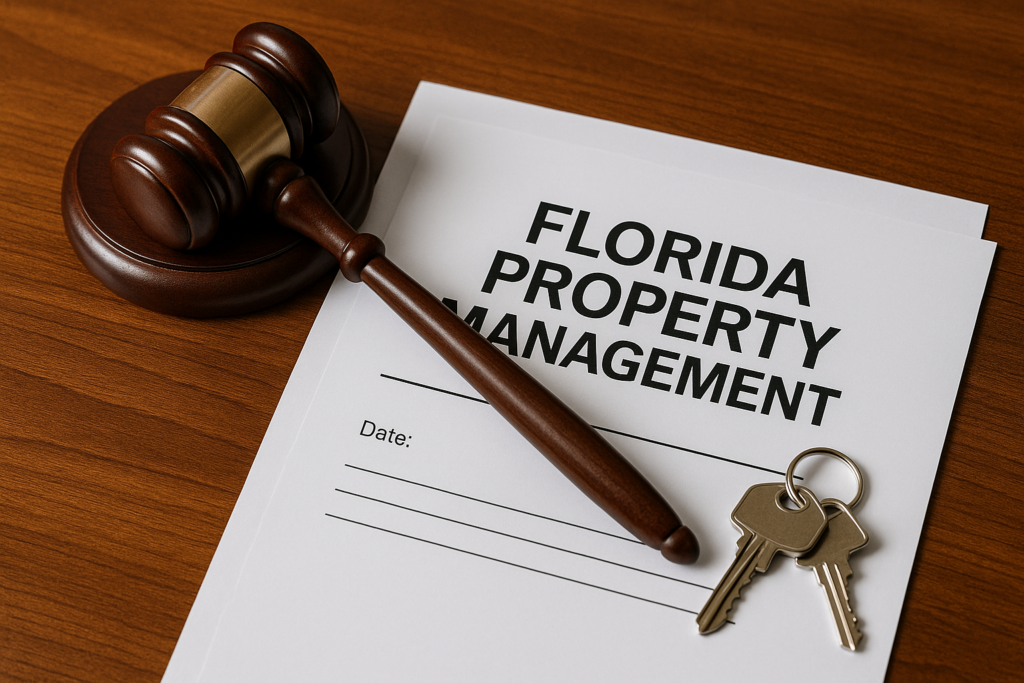
Florida Property Management Laws: Essential Tips for Landlords and Tenants
Florida Property Management Laws: Essential Guide for Landlords and Tenants
Quick Answer: Florida requires property managers to hold a real estate broker’s license if they handle rentals for others and receive commission-based pay. Chapter 83 of Florida Statutes governs key areas like security deposits, leases, and evictions, while the Department of Business and Professional Regulation oversees compliance.
Whether you’re managing your first rental property or overseeing a portfolio of hundreds, understanding Florida’s property management laws isn’t optional—it’s essential for staying compliant and protecting your investment.
Licensing Requirements: What You Need to Know
Property Manager License Requirements
Here’s the deal: if you’re managing properties for others and getting paid by commission, you need a real estate broker’s license in Florida. This means completing a 63-hour pre-licensing course approved by the Florida Real Estate Commission (FREC), passing the state exam, and submitting to a background check with fingerprinting.
Exception: Salaried property managers who don’t receive commission or per-transaction fees may be exempt from licensing requirements.
Property Management Company Regulations
Running a property management company? You’ll need a licensed broker in charge of operations—either the owner or a designated compliance officer. Corporate entities must register with the Department of Business and Professional Regulation, and everyone involved must maintain proper certifications.
Community Association Manager (CAM) License
Managing homeowner or condo associations requires a separate CAM license. You’ll need a high school diploma, completion of a state-approved course, and passing the state exam. This specialized license focuses specifically on association management rather than individual rental properties.
Key Florida Statutes Every Property Manager Should Know
Fair Housing Compliance
Florida’s fair housing laws are straightforward: you can’t discriminate based on race, color, national origin, religion, sex, familial status, or disability. This applies to everything from tenant screening to advertising language. Keep your processes consistent and documented to avoid legal issues.
Lease Agreement Requirements
Your lease agreements must include clear information about rent amounts, due dates, late fees, and both parties’ rights and responsibilities. Florida law requires transparency about repair procedures and notice periods for lease termination.
Security Deposit Handling
This is where many property managers trip up. Florida requires you to:
- Place deposits in a separate escrow account or post a surety bond
- Notify tenants in writing where their deposit is held
- Return deposits within 15 days if no damages exist
- Notify tenants within 30 days if making claims against the deposit
Managing Tenant-Landlord Relations
Lease Management Best Practices
A solid lease agreement prevents most disputes before they start. Include specific policies on maintenance responsibilities, repair procedures, and payment methods. Both parties should sign and date the document to make it legally binding.
Maintenance and Repair Responsibilities
Landlords must maintain properties to health and safety standards—think functional plumbing, heating, and structural integrity. Tenants are responsible for keeping units clean and reporting issues promptly. Clear communication prevents most maintenance disputes.
Rent Collection and Late Fees
Late fees must be reasonable and clearly outlined in the lease. Offering multiple payment methods (online, check, etc.) encourages timely payments and reduces collection headaches.
Eviction Process Overview
Florida’s eviction process follows strict timelines:
- 3-Day Notice to Pay for unpaid rent
- 7-Day Notice to Cure for fixable lease violations
- Proper legal procedures must be followed—no self-help evictions allowed
Financial Management Essentials
Budgeting for Success
Track all expenses including staff salaries, license fees, escrow accounts, and maintenance costs. Keep a reserve fund for unexpected repairs or legal fees. Property management software can streamline financial tracking and reporting.
Understanding Management Fees
Management fees typically range from 8-12% of monthly rent, covering property maintenance, tenant communication, and leasing activities. Additional fees might include application processing and commission-based compensation structures.
Compliance and Risk Management
Health and Safety Requirements
Regular property inspections ensure compliance with safety codes. Key areas include:
- Functional smoke detectors
- Proper electrical wiring
- Well-maintained plumbing
- Pest control
- ADA compliance where applicable
Insurance and Liability Protection
Proper insurance coverage is non-negotiable. General liability insurance covers tenant injuries, while property insurance protects against fire, hurricanes, and floods. In Florida’s humid climate, consider mold insurance as well.
Handling Legal Issues
When facing violations or legal actions, act quickly and document everything. Keep detailed records of communications, payments, and maintenance activities. Having legal counsel on retainer can prevent small issues from becoming major problems.
Managing Different Property Types
Residential vs. Commercial Properties
Residential properties require broker licensing for commission-based managers and must address domestic violence protections and shared utilities. Commercial properties involve more complex lease agreements and specific safety protocols.
Homeowners Associations
HOA management often requires a CAM license and involves unique responsibilities like financial management, shared space maintenance, and community rule enforcement.
Common Penalties and How to Avoid Them
Operating without proper licensing can result in substantial fines, business shutdown, and potential criminal charges. The Department of Business and Professional Regulation actively investigates complaints and violations, so compliance isn’t optional.
Filing Complaints
Having issues with a property management company? File complaints with the Department of Business and Professional Regulation. They investigate and handle violations of property management practices.
Navigate Florida Property Management Laws with Confidence
Florida’s property management landscape demands expertise, attention to detail, and unwavering compliance with state regulations. From licensing requirements to security deposit handling, the stakes are high for both landlords and property managers. At Kanga Property Management, we’ve mastered the complexities of Florida property law so you don’t have to. Our licensed professionals ensure your properties stay compliant while maximizing your investment returns. Don’t risk costly violations or legal complications—partner with Kanga Property Management today and experience the peace of mind that comes with expert property management services tailored specifically for Florida’s unique regulatory environment.


